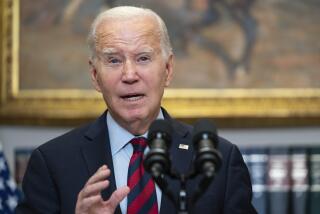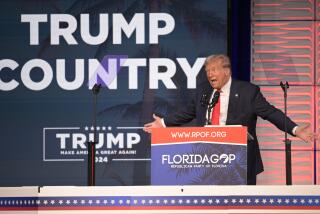Romney’s to-do list is long, if short on details
TAMPA, Fla. — As he has campaigned for president, Mitt Romney has made one thing clear: In his first term he would try to dramatically shrink the size of government to wean Americans from what he views as too much reliance on the federal government for basic services such as healthcare and food stamps.
Romney’s chances of success will depend on cooperation from Congress, but he has outlined an ambitious set of goals, even for his first day in office.
Powerless to actually “repeal and replace” President Obama’s healthcare plan on his own, Romney has said he would issue a first-day executive order directing federal officials to try to shift authority over some aspects of the program to the states. He would order agencies to begin eliminating Obama-era regulations “that unduly burden the economy or job creation” — a broad directive that could depend on his definition of “unduly burden.”
He has said he would order the Treasury Department to immediately label China as a “currency manipulator.” And just last week in New Mexico, he outlined a plan to revamp the process for issuing drilling permits for domestic oil and gas exploration — with the goal of giving greater flexibility to states.
Though his options will hinge on which party controls the Senate, the former Massachusetts governor has also pledged to introduce several bills on his first day: measures to slash the corporate income tax rate to 25%, cut nonsecurity spending by 5%, give states authority over federal job retraining programs, and direct the Department of the Interior to survey U.S. energy reserves with the goal of opening new areas for domestic exploration — a item of particular interest to California.
Romney has also embraced many of the concepts of the budget plan of his running mate, House Budget Chairman Paul D. Ryan, who wants to impose across-the-board tax cuts while slashing spending on federal programs that help the poor and the elderly. But Romney has declined to talk about key details that could be politically perilous — such as transforming the Medicare system by offering future seniors the option of vouchers to purchase their health insurance.
Romney advisors have not said how big the federal vouchers would be — and how they would adjust that level of support to keep up with the rapidly increasing costs of healthcare. They argue that those sorts of details should be hammered out in consultation with Congress next year. But critics say that alone could mean a difference of hundreds of dollars, if not several thousand dollars, in the annual budgets of American seniors — and that, more broadly, Romney’s budget plan doesn’t add up.
As much as the details, though, the heart of the presidential debate over the next couple months will be Obama’s and Romney’s differing visions of the role that government plays in the daily lives of Americans.
Obama argues that the vision Romney has sketched would favor the rich with tax cuts while shredding the social safety net.
“Their idea is let’s have another $5-trillion tax cut on top of the [George W.] Bush tax cuts, even if it means gutting education investment, even if it means we’re not rebuilding America, even if it means voucherizing our Medicare system, even if it means that we are weakening the safety net,” Obama said in early August during a campaign event in Chicago. “This $5-trillion tax cut is not to lower our deficit. It’s not to help invest in America. This $5-trillion tax cut would be used basically to give folks like me or Mr. Romney an additional $100,000, $200,000, million dollars that we don’t need.”
For his part, Romney argues that Americans have become too dependent on government to solve their problems — and that cutting taxes, as well as the size of government, would give individuals greater power to invest and fuel economic growth.
“The strength and power and goodness of America has always been based on the strength and power and goodness of our communities, our families, our faiths,” Romney said in his speech at the Republican National Convention this week.
Romney’s advisors say Obama’s failure to clearly outline his plans for the second term suggests that Americans would see little change in the economy over the next four years under his leadership.
“President Obama has made it clear that he thinks his policies have worked, so I think the American people have a good sense that we can expect more of same policies — more debt, more trillion-dollar deficits, more stagnant job growth,” said Romney policy advisor Jonathan Burks. “To do more of the same and expect different results is preposterous.”
Burks noted that Romney had set specific economic benchmarks to reach by the end of his first term as a result of his tax cuts and investment incentives: 12 million new jobs and an economy that is growing by about 4% a year.
In addition to lowering the corporate tax rate from 35% to 25%, Romney would extend all of the Bush-era tax cuts and eliminate the estate tax. So far neither Romney nor his running mate has explained how they would pay for those changes. During an interview with Fox earlier this week, Ryan said that “instead of having Washington pick winners and losers, we’re going to plug those [tax] loopholes and lower tax rates for everybody.”
When pressed for more details, Ryan said he and Romney wanted to seek the input of Congress. “We want to go through a transparent process in Congress where we have a dialogue with the public,” he said.
Romney has said repealing Obama’s healthcare program will produce $95 billion in savings, but beyond that he has outlined only a few cuts that constitute a tiny fraction of the federal budget. Among them are eliminating federal funding for Planned Parenthood and Amtrak, and reducing foreign aid as well as subsidies for the Corporation for Public Broadcasting, which supports PBS and NPR.
Romney made his most detailed remarks at a private fundraiser in Florida, where he said he would combine and eliminate federal departments, including the Department of Housing and Urban Development, and would either consolidate the Department of Education with another agency or make it a “heck of a lot smaller.”
Of course, presidential candidates often find their desires thwarted by the checks and balances of Washington. Just as a Republican House has blunted Obama’s wishes , so too could a Democratic Senate block the proposals of a President Romney. And policies that have burrowed into the bureaucracy can prove either difficult to fully extract — or may have grown politically popular with time.
At his rallies, Romney often gets the loudest applause when he says one of his first acts in office would be to “repeal Obamacare.” He has said he would ask the secretary of Health and Human Services to return the “maximum possible authority” to the states to design their own programs. Romney has argued that will create greater flexibility and choice, but has not explained precisely what those changes would mean.
The Obama campaign, in turn, has tried to convince voters that would be a dangerous approach — in part by noting that it could mean the repeal of some of the most popular aspects of the president’s healthcare plan, including protections for Americans with preexisting conditions and coverage for young adults who are now able to get insurance coverage well into their 20s under their parents’ plans.
Romney has insisted that seniors would see a decline in their healthcare coverage because Obama agreed to $700 billion in cuts to Medicare — savings that come from reducing payments to insurance companies, hospitals and other providers — in order to pay for his healthcare plan.
But while he has insisted that he would restore those cuts, he has not explained how he would do so — and independent analysts have pointed out that change would mean the Medicare trust fund would be exhausted in 2016.
More to Read
Get the L.A. Times Politics newsletter
Deeply reported insights into legislation, politics and policy from Sacramento, Washington and beyond. In your inbox three times per week.
You may occasionally receive promotional content from the Los Angeles Times.







